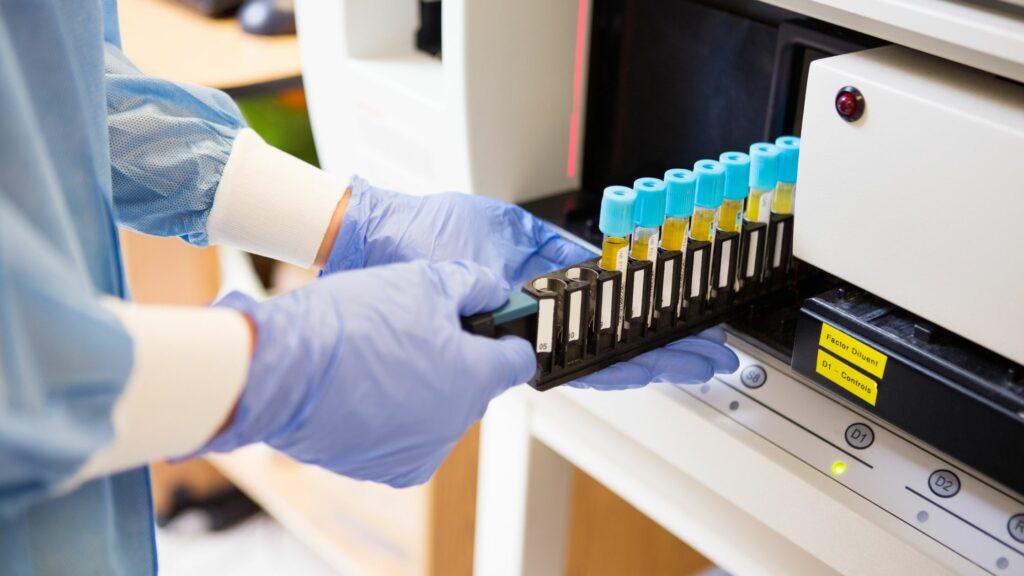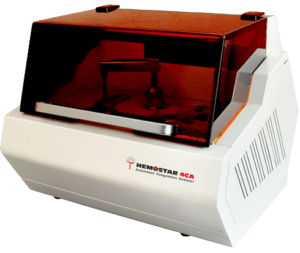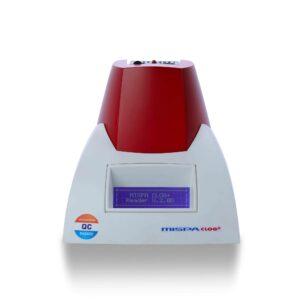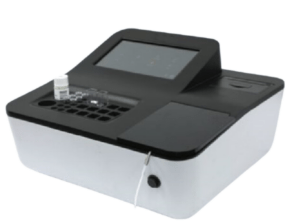Discover the fundamentals of coagulation analyzers, explore the latest advancements, troubleshoot common issues, and unravel the future trends in coagulation analysis.
Are you curious about the remarkable world of coagulation analyzers and their pivotal role in diagnosing clotting disorders? Look no further! In this blog, we will dive deep into the realm of coagulation analysis, shedding light on various aspects that will empower you to make informed decisions for your laboratory or healthcare facility. Moreover, we will also introduce you to Medzell, a futuristic B2B platform that revolutionizes the promotion of Indian medical devices in emerging markets. So, let’s embark on an enlightening journey through the fascinating realm of coagulation analyzers.
Understanding Coagulation Analyzer
Coagulation analyzers are cutting-edge medical instruments that play a vital role in diagnosing clotting disorders and ensuring optimal patient care. The principles of coagulation analyzers, their importance in healthcare, and the various types of analyzers on the market will all be covered in this part. So, let’s unravel the secrets of this remarkable technology!
Coagulation Analyzer: An Overview
Coagulation analyzers are sophisticated devices used to measure the clotting ability of the blood and detect abnormalities in the coagulation process. These enable healthcare professionals to perform a range of evaluations that aid in the recognition and monitoring of clotting disorders such as hemophilia, thrombophilia, and von Willebrand disease.
Role of Coagulation Analyzers in Diagnosing Clotting Disorders
Coagulation analyzers are invaluable tools in the field of hemostasis testing, which involves assessing the blood’s ability to form and dissolve clots. By measuring various clotting factors and parameters, coagulation analyzers provide crucial information about a patient’s coagulation profile, enabling accurate diagnosis and effective treatment planning.
Types of Coagulation Analyzers
Coagulation analyzers come in different forms, each offering unique features and benefits. Let’s explore the three primary types of coagulation analyzers
- Benchtop Coagulation Analyzers: These compact devices are designed for smaller laboratories or clinics with lower testing volumes. Despite their smaller size, benchtop analyzers deliver accurate and reliable results for clotting tests, making them an ideal choice for many healthcare settings.
- Automated Coagulation Analyzers: These devices automate the testing process using robots and cutting-edge technology, increasing workflow efficiency and reducing the risk of human mistakes. These analyzers are capable of handling a high volume of samples and delivering precise results within a shorter turnaround time.
- Point-of-Care Coagulation Analyzers: Point-of-care analyzers offer the advantage of portability and rapid results, making them suitable for decentralized testing settings such as emergency departments and ambulances. These analyzers enable healthcare professionals to obtain immediate test results, enabling prompt decision-making and improving patient outcomes.
Exploring Benchtop Coagulation Analyzers
Benchtop coagulation analyzers are the unsung heroes of many laboratories and clinics, offering accurate and reliable results for clotting tests. In this section, we will delve into the world of benchtop analyzers, exploring their key features, benefits, and potential applications. So, let’s uncover the secrets behind these compact yet powerful devices!
Key Features of Benchtop Coagulation Analyzers
Benchtop coagulation analyzers are packed with features that make them indispensable in the field of coagulation testing. Here are some key features to consider:
- Compact Design: The compact size of benchtop analyzers makes them suitable for laboratories with limited space. They can fit seamlessly into smaller work areas without compromising on performance.
- User-Friendly Interface: Benchtop analyzers often boast intuitive interfaces that simplify operation and reduce the learning curve for laboratory technicians. This user-friendly design enhances productivity and ensures smooth testing processes.
- Multiple Test Capabilities: Despite their smaller size, benchtop analyzers offer a wide range of test capabilities, allowing healthcare professionals to perform various clotting tests efficiently. From prothrombin time (PT) and activated partial thromboplastin time (aPTT) to D-dimer and fibrinogen assays, these analyzers cover an extensive range of coagulation tests.
Benefits and Applications of Benchtop Coagulation Analyzers
Benchtop coagulation analyzers offer numerous benefits that make them a popular choice in laboratories and clinics. Let’s explore some of these benefits and their potential applications:
- Cost-Effective Solution: Benchtop analyzers are often more affordable than larger, automated systems, making them an attractive option for facilities with budget constraints. Their cost-effectiveness allows smaller laboratories and clinics to provide comprehensive coagulation testing without compromising on quality.
- Flexibility and Versatility: Due to their compact size and diverse test menu, benchtop analyzers provide flexibility and versatility to healthcare facilities. They can be easily integrated into existing laboratory workflows and adapt to changing testing needs.
- Ideal for Small to Medium Testing Volumes: Benchtop analyzers are well-suited for laboratories with small to medium testing volumes. They efficiently handle a moderate number of samples while delivering accurate and reliable results.
The Future of Benchtop Coagulation Analyzers
The future of benchtop coagulation analyzers looks promising, with continuous advancements aimed at improving performance, enhancing connectivity, and integrating artificial intelligence for data analysis. As technology evolves, benchtop analyzers will become even more powerful, enabling healthcare professionals to deliver precise and timely coagulation test results.
Unveiling Automated Coagulation Analyzers
Automation has revolutionized the field of coagulation testing, and automated coagulation analyzers are at the forefront of this transformation. In this section, we will explore the features, functionalities, and benefits of automated coagulation analyzers. Let’s unlock the potential of these advanced instruments!
Advantages of Automated Coagulation Analyzers
Automated coagulation analyzers offers several advantages. Let’s delve into a more detailed examination of these advantages:
- Workflow Efficiency: By automating various steps of the testing process, such as sample handling, reagent dispensing, and result interpretation, automated analyzers significantly reduce manual labor and minimize the risk of human error. Workflows are streamlined, productivity rises, and turnaround times decrease as a result of this automation.
- High Testing Throughput: Automated analyzers are designed to handle a high volume of samples simultaneously. This high testing throughput is especially beneficial for large laboratories and hospitals that deal with a substantial number of coagulation tests daily.
- Quality and Accuracy: Automated analyzers provide precise and consistent results, eliminating inter-operator variability and reducing the chances of errors caused by manual pipetting or timing. This high level of accuracy ensures reliable test outcomes and improves patient care.
Advanced Functionalities of Automated Coagulation Analyzers
- Random Access Testing: Automated analyzers can perform tests on multiple samples simultaneously, without the need to run samples in batches or predefined sequences. This random access testing capability allows for greater flexibility and faster test result availability.
- Integration with Laboratory Information Systems: Automated analyzers seamlessly integrate with laboratory information systems (LIS), enabling efficient data management, result tracking, and streamlined communication between the analyzer and other laboratory devices.
Future Trends in Automated Coagulation Analyzers
The future of automated coagulation analyzers holds immense potential for further advancements. We can expect to see the integration of artificial intelligence and machine learning algorithms for improved data analysis and interpretation. Additionally, connectivity options will continue to evolve, allowing for seamless data transfer and remote monitoring capabilities.
Navigating Point-of-Care Coagulation Analyzers
Point-of-care (POC) coagulation analyzers offer the convenience of rapid testing and portability, making them invaluable in emergency settings and decentralized healthcare facilities. In this section, we will navigate through the landscape of POC coagulation analyzers, exploring their applications, limitations, and key considerations. Let’s discover the potential of point-of-care testing!
Key Considerations for Point-of-Care Coagulation Analyzers
When considering a POC coagulation analyzer for your healthcare practice, there are some key factors to keep in mind:
- Test Menu: Evaluate the test menu offered by the analyzer and ensure it covers the necessary tests for your clinical needs. Consider the specific coagulation parameters and assays required in your practice.
- Ease of Use: POC analyzers should be user-friendly, allowing healthcare professionals with varying levels of expertise to operate them effectively. Intuitive interfaces and clear instructions are essential for obtaining accurate results.
- Quality Assurance and Connectivity: Look for POC analyzers that offer robust quality control features and connectivity options. Quality assurance measures are crucial to ensure reliable test results, while connectivity facilitates data transfer and integration with electronic medical records or laboratory information systems.
Advantages of Point-of-Care Coagulation Analyzers
POC coagulation analyzers offer unique advantages that make them indispensable in specific healthcare settings. Here are some key advantages.
- Rapid Results: POC analyzers provide immediate test results, allowing healthcare professionals to make timely decisions and initiate appropriate interventions promptly. This rapid turnaround time is critical in emergency situations and critical care settings.
- Portability and Convenience: POC analyzers are compact, lightweight, and designed for on-the-spot testing. Their portability enables healthcare providers to perform coagulation tests at the patient’s bedside, in ambulances, or remote locations, eliminating the need for sample transportation and reducing turnaround times.
Applications and Limitations of Point-of-Care Coagulation Analyzers
POC coagulation analyzers find applications in various clinical scenarios, but they also have limitations that should be considered. Let’s explore both aspects.
- Applications: POC analyzers are particularly useful in emergency departments, ambulances, and critical care units where immediate test results are crucial for making rapid treatment decisions. They also serve as valuable tools in situations where access to central laboratory facilities is limited, such as remote or resource-limited settings.
- Limitations: POC analyzers typically offer a narrower test menu compared to larger laboratory-based analyzers. They may not provide the same level of complexity and extensive panel of tests. Additionally, POC analyzers may have slightly higher variability compared to central laboratory-based instruments.
Troubleshooting Common Issues with Coagulation Analyzers
Like any medical instrument, coagulation analyzers may encounter issues that require troubleshooting. In this section, we’ll talk about some frequent problems and offer some potential fixes to assist you get through these obstacles.
- Possible Causes: Inconsistent or unreliable results can be caused by factors such as improper sample handling, expired or degraded reagents, inadequate mixing of samples and reagents, instrument malfunction, or calibration errors.
- Potential Solutions: Ensure proper sample collection, handling, and storage. Verify the quality and expiration dates of reagents. Follow the manufacturer’s instructions for sample and reagent mixing. Perform regular instrument maintenance and calibration according to the manufacturer’s guidelines.
Instrument Malfunction or Error Messages
- Possible Causes: Instrument malfunction or error messages can occur due to various reasons, such as software glitches, mechanical issues, power fluctuations, or sensor malfunctions.
- Potential Solutions: Restart the analyzer and ensure the latest software updates are installed. If the issue persists, consult the manufacturer’s technical support for troubleshooting guidance or consider a service visit by qualified engineers.
Connectivity or Data Transfer Problems
- Possible Causes: Connectivity or data transfer problems can arise from network issues, compatibility conflicts, incorrect settings, or problems with the laboratory information system (LIS) integration.
- Potential Solutions: Check network connections and settings to ensure proper connectivity. Verify compatibility between the analyzer and the LIS. ensure correct configuration and settings for data transfer. Consult the manufacturer or IT support for assistance if needed. always remember that these are broad troubleshooting suggestions and that it is always advised to refer to and abide by the recommendations made by the manufacturer of the analyzer
The Future of Coagulation Analysis
As we look ahead, the future of coagulation analysis holds exciting possibilities. Here are some potential future trends.
- Integration of Artificial Intelligence: Artificial intelligence (AI) and machine learning algorithms can enhance data analysis and interpretation, leading to more accurate and personalized diagnostic insights.
- Advanced Biomarkers and Point-of-Care Testing: The discovery of novel biomarkers and the development of advanced point-of-care testing technologies may revolutionize coagulation analysis, enabling earlier detection and personalized treatment approaches.
- Remote Monitoring and Telemedicine: Coagulation analyzers with remote monitoring capabilities and integration with telemedicine platforms may facilitate remote patient management, especially for patients with chronic clotting disorders.
- Microfluidics and Lab-on-a-Chip Technologies: Developments in microfluidics and lab-on-a-chip technologies could result in miniature coagulation analyzers that provide quick and extremely sensitive testing in a portable manner.
As technology continues to evolve, coagulation analyzers will become increasingly sophisticated, empowering healthcare professionals with improved diagnostic capabilities, streamlined workflows, and enhanced patient care.
Coagulation Analyzer from Leading Indian Manufacturer
Hemostar 4CA
Hemostar 4CA is a fully automated 4-channel coagulation analyzer, manufactured and globally supplied by Tulip Diagnostics (P) Ltd. in India. This advanced analyzer is designed to measure PT (Prothrombin Time), APTT (Activated Partial Thromboplastin Time), and FIB (Fibrinogen) levels. It utilizes a photo-optical measuring principle to ensure accurate and reliable results. Hemostar 4CA offers the flexibility of automatic or manual calibration, allowing customization according to laboratory requirements. The tilted reagent position maximizes reagent utilization, contributing to cost-efficiency. With multilevel quality control and Levey Jennings chart, laboratories can maintain quality assurance. The analyzer also includes a manual testing mode for backup purposes. The user-friendly Windows-based system makes operation and result interpretation easy. Hemostar 4CA is compatible with the Uniplastin System Pack (PT), the Liquicelin-E System Pack (APTT), and the Fibroquant System Pack (FIB). Additionally, the analyzer utilizes disposable reaction cuvettes, ensuring convenience and preventing cross-contamination.
Mispa Clog Plus
Agappe Diagnostics manufactures Mispa Clog Plus, an innovative hemostasis analyzer with smart card calibration technology. This analyzer offers a simple and quick coagulation analysis solution. Mispa Clog Plus is available in control and sample modes, providing flexibility in testing. The analyzer features a user-friendly interface with a quick start menu, allowing efficient workflow management. It includes one reading chamber and four positions for reagent and sample incubation. The special magnetic stir bar ensures effective homogenization of the test suspension, enhancing sensitivity. Test results are displayed in various parameters such as seconds (Sec), International Normalized Ratio (INR), and percentage (%). For other parameters, Mispa Clog Plus displays results in units such as gm/L, mg/dL, or ratio. The analyzer provides information on the number of tests performed, remaining tests, and reagent stability, enabling better laboratory management. Agappe Diagnostics also offers a range of reagents, including system reagents (PT, APTT, and FIB), open reagents (PT and APTT), and calibration and control reagents (Coagulation Control), specifically designed for use with Mispa Clog Plus.
AFFI-C Chem
AFFI-C Chem is a coagulation analyzer manufactured and globally supplied by Affigenix Biosolutions Pvt. Ltd. in India. This coagulation analyzer features a 7″ touch screen and a semi-automatic design, providing ease of use and efficient workflow management. AFFI-C Chem is capable of performing coagulation, turbidimetry, and biochemistry tests, offering a comprehensive solution for laboratory testing needs. The analyzer includes a fault alarm display and a lamp-saver mode, optimizing resource utilization and ensuring uninterrupted operation. With ILMS (Integrated Laboratory Management System) integration and improved data management, AFFI-C Chem streamlines laboratory processes and enhances productivity. The analyzer generates alphanumeric patient IDs and names, facilitating easy identification and result interpretation. Preloaded test protocols simplify test selection, saving time and reducing errors. Each page on the interface displays up to 30 tests, providing a comprehensive overview of test results and facilitating efficient result analysis.
Conclusion
Coagulation analyzers play a vital role in diagnosing and managing clotting disorders, enabling healthcare professionals to provide optimal patient care. From compact yet versatile benchtop analyzers to high-throughput automated systems and portable point-of-care devices, each type of coagulation analyzer offers unique advantages and applications. As you explore the realm of coagulation analyzers, consider your specific requirements, the volume of testing, and the clinical setting to choose the most suitable analyzer for your practice. And remember, troubleshooting resources and manufacturer support are valuable assets to address any challenges you may encounter.





